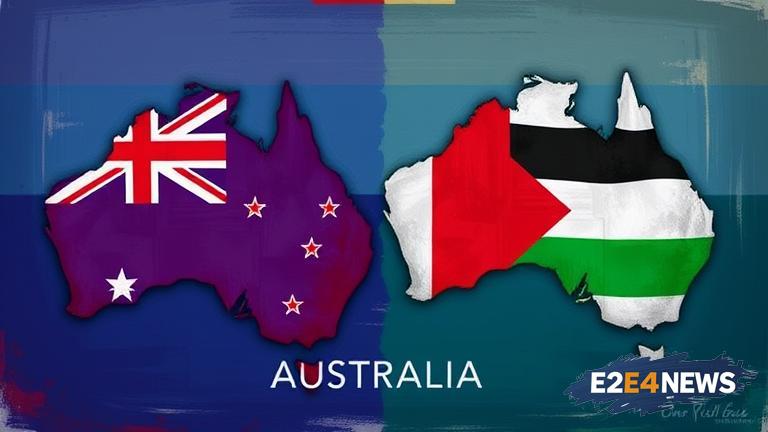A new poll conducted by the Guardian has revealed that Australians are split on the issue of recognizing Palestine, with a significant proportion of respondents believing that such a move would be purely symbolic. The poll, which surveyed over 1,000 Australians, found that 45% of respondents supported recognizing Palestine, while 32% opposed the idea. The remaining 23% were undecided. The poll also found that a majority of Australians, 55%, believed that recognizing Palestine would have no significant impact on the Israeli-Palestinian conflict. On the other hand, 21% believed that recognition would help to resolve the conflict, while 15% thought it would make things worse. The poll’s findings suggest that Australians are skeptical about the effectiveness of recognizing Palestine, with many viewing it as a symbolic gesture rather than a meaningful step towards resolving the conflict. The issue of recognizing Palestine has been a contentious one in Australia, with some arguing that it would be a crucial step towards achieving peace and justice in the region, while others believe that it would be a futile gesture that would only serve to antagonize Israel. The poll’s findings are likely to be seen as a reflection of the complexity and nuance of Australian public opinion on the issue. The Guardian’s poll also found that there were significant differences in opinion between different demographic groups, with younger Australians and those from non-English speaking backgrounds more likely to support recognizing Palestine. In contrast, older Australians and those from English-speaking backgrounds were more likely to oppose the idea. The poll’s findings are likely to be of interest to policymakers and politicians, who are grappling with the issue of how to balance Australia’s relationships with both Israel and Palestine. The Australian government has previously stated its support for a two-state solution to the Israeli-Palestinian conflict, but has stopped short of recognizing Palestine as a sovereign state. The poll’s findings suggest that there is no clear consensus on the issue among the Australian public, and that any decision to recognize Palestine would be likely to be highly contentious. The issue of recognizing Palestine is not just a matter of foreign policy, but also has significant implications for domestic politics in Australia. The poll’s findings are likely to be seen as a reflection of the deep divisions that exist within Australian society on the issue, and the need for a nuanced and informed debate about the best way forward. The Guardian’s poll is the latest in a series of surveys that have sought to gauge Australian public opinion on the issue of recognizing Palestine. The findings are likely to be of interest to scholars and researchers, who are seeking to understand the complexities of Australian public opinion on the issue. The poll’s findings also highlight the need for greater education and awareness about the issue of recognizing Palestine, and the need for a more informed and nuanced debate about the best way forward. The issue of recognizing Palestine is a complex and multifaceted one, and the poll’s findings suggest that there is no easy solution. However, by engaging in a more informed and nuanced debate, Australians can work towards a deeper understanding of the issue and the development of more effective policies. The poll’s findings are a reminder that the issue of recognizing Palestine is not just a matter of foreign policy, but also has significant implications for domestic politics and society in Australia. The need for a more informed and nuanced debate about the issue is clear, and the Guardian’s poll is an important contribution to this debate. The poll’s findings are likely to be of interest to a wide range of stakeholders, including policymakers, politicians, scholars, and the general public. The issue of recognizing Palestine is one that is likely to continue to be a major point of contention in Australian politics and society, and the need for a more informed and nuanced debate about the issue is clear. The Guardian’s poll is an important step towards achieving this goal, and its findings are likely to be widely discussed and debated in the coming weeks and months.





